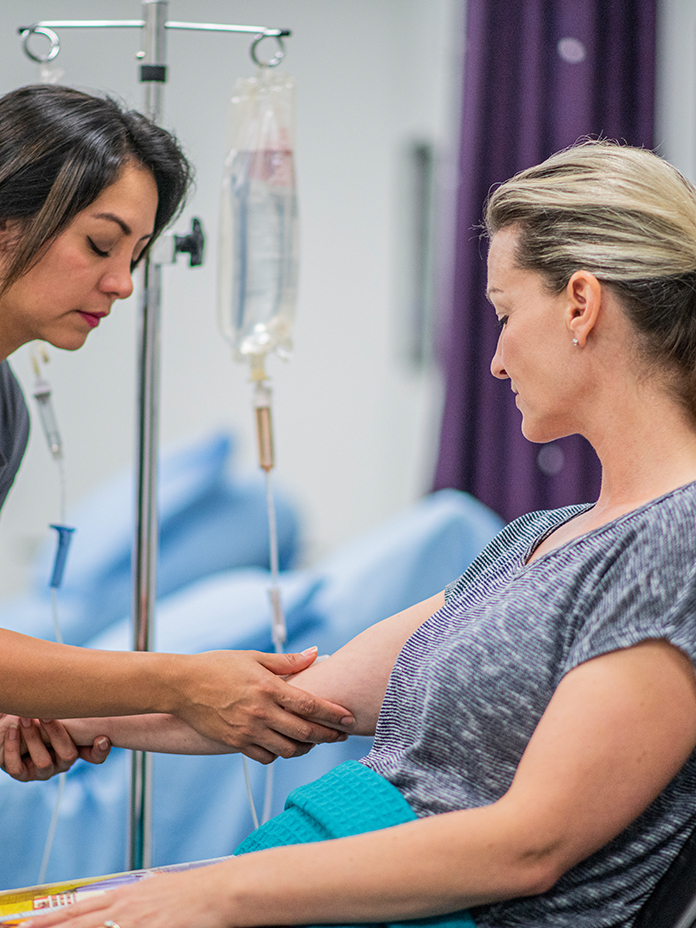Another group or vendor provides the info on the next page. If you don’t want to leave our site, choose the “X” in the upper right corner to close this message. Or choose “Go on” to move forward.

How prenatal care can help
If you’ve already chosen your pregnancy provider, make an appointment. They’ll tell you how often to see them. Early and regular care is so important for health — your baby’s and yours, too. Your provider can help you:
- Get regular prenatal care and services
- Join special classes for moms-to-be, such as childbirth or parenting classes
- Learn what to expect during your pregnancy
- Find info about good nutrition, exercise and other helpful advice
- Get family planning services after your baby is born
Places to go for a healthy pregnancy
Keep all your appointments with your provider — challenge yourself to make every single one. They’ll let you know when to come for the next visit.
Try birthing classes. Many classes have no cost and can help with your pregnancy and delivery. Ask your provider how to sign up.
Things to do for a healthy pregnancy
Ask your provider what’s safe and unsafe to do while you’re pregnant. Here are some basics:
- Start taking prenatal vitamins (especially folic acid). They can help prevent birth defects of your baby’s brain and spinal cord. And you can get these without a prescription.
- If you haven’t already, move toward a healthy diet. You need more protein, iron, calcium and folic acid when you’re pregnant. You need more water too. Learn more about healthy eating during pregnancy.
- Stay active physically. If you haven’t been in the past, check with your doctor for advice about ways to be active and prevent injuries.
- Stay away from alcohol, nicotine (smoking) and street drugs. They’re not good for you. And they can cause preterm (early) labor. If you do use these substances, don’t stop suddenly. Your doctor can help you quit safely. No judgment, either. Your doctor wants to help.
- Limit your caffeine. Check with your doctor about whether some caffeine may be okay for you.
- Find out if you need a blood test for lead. High levels of lead can harm you and your baby.

Videos about pregnancy, birth and after
- Play all videos English | Spanish
- What is an OB/GYN? English | Spanish
- What is a certified nurse midwife? English | Spanish
- Getting on a pregnancy care routine with your doctor English | Spanish
- Tips for a healthy pregnancy English | Spanish
- What should I eat when I’m pregnant? English | Spanish
- What to expect in birthing classes? English | Spanish
- How do I prepare for labor? English | Spanish
- What happens after my baby arrives? English | Spanish
- Resources to help you and your new baby English | Spanish
- What is postpartum depression? English | Spanish

Adjust to your changing body
Your body goes through a lot of changes during pregnancy. You may not be expecting things like body aches, sleep problems or constipation. These are some common changes and discomforts that can go along with pregnancy. Try these tips:
- Get good prenatal care, keep all your appointments and ask your provider lots of questions.
- Eat a healthy diet, including fiber-rich foods like fruit, raw or cooked leafy greens and whole-grain cereals and breads.
- Drink more water and avoid caffeine, especially later in the day.
- Practice good sleep habits and get plenty of rest.
You can get more tips on what to do about body changes and discomforts.
Give baby a healthy start
What is preterm (early) labor?
If labor starts before 37 weeks of pregnancy, this is preterm labor. It can cause health problems that put your baby’s life in danger.
- Change in vaginal discharge (watery, mucus or bloody)
- Constant low, dull backache
- Contractions with or without pain, making the belly tighten
- Pelvic pressure (like the baby is pushing down)
- Stomach cramps (with or without diarrhea)
- Water breaks
If you have any symptoms of preterm labor, get help quickly. Don't wait for them to go away.
What is premature birth?
Any birth before 37 weeks results in a premature baby. These babies may not have finished development. They may need to stay in the hospital longer for special care. Or have problems with their brain, lungs, heart, eyes and other organs. These problems can last a lifetime or may not show up until later in childhood. They can cause a child to have trouble or develop more slowly with:
- Learning
- Communicating
- Caring for themselves
- Getting along with others
How can you help avoid premature birth? Get early care. And be sure to keep all your health care appointments.


After baby’s birth (postpartum care)
After you give birth, you still need care. Schedule and go to all of your visits, even if you feel fine. You should see your doctor within 7 to 84 days of having your baby. Your doctor may want to see you more than once. This is to:
- Make sure you’re healing properly
- Discuss how you’re feeling
- Answer any of your questions
- Talk about family planning
They can happen up to a year after having your baby:
- Headache that won't go away or gets worse over time
- Dizziness or fainting
- Thoughts about hurting yourself or your baby
- Changes in your vision
- Fever of 100.4° or higher
- Trouble breathing or fast-beating heart
- Chest pain
- Severe belly pain or nausea
- Heavy bleeding (more than one pad an hour)
- Severe swelling, redness or pain in your leg or arm
If you feel like something just isn't right, or aren't sure if it's serious, call your doctor. Be sure to tell them you were pregnant in the last year.
If you’re having a health emergency, call 911.
Not yet a member?
Learn about becoming a member in Mercy Care Medicaid plans or Mercy Care Advantage.
Not yet a member?
Learn about becoming a member in Mercy Care Medicaid plans or Mercy Care Advantage.

